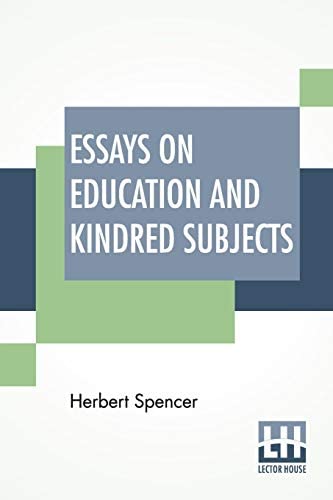Newly released
This book is new and will be uploaded as soon as it becomes available to us and if we secure the necessary publishing rights.

Essays on Education and Kindred Subjects Book PDF
(0)
Author:
Herbert SpencerNumber Of Reads:
223
Language:
English
Category:
Social sciencesSection:
Pages:
375
Quality:
excellent
Views:
1686
Quate
Review
Save
Share
Book Description
This volume book contains a collection of philosophical essays written by Herbert Spencer. The essays contained within this book were originally published in the 'Westminster Review', the 'North British Review', and the 'British Quarterly Review'. They include: Educational: Intellectual, Moral, and Physical, What Knowledge is of Most Worthy, Intellectual Education, Moral Education, Physical Education, Progress: It s Law and Cause, On Manners and Fashion, and more. This fantastic collection is highly recommended for those with a keen interest in nineteenth century philosophy, and is not to be missed by fans and collectors of Spencer s work. Herbert Spencer (1820 - 1903) was an esteemed English philosopher, anthropologist, biologist, and sociologist. Many vintage texts such as this are increasingly scarce and expensive, and it is with this in mind that we are republishing this book now, in an affordable, high-quality, modern edition. It comes complete with a specially commissioned biography of the author."
Herbert Spencer
Herbert Spencer was an English philosopher, psychologist, biologist, anthropologist, and sociologist famous for his hypothesis of social Darwinism. Spencer originated the expression "survival of the fittest", which he coined in Principles of Biology (1864) after reading Charles Darwin's On the Origin of Species. The term strongly suggests natural selection, yet Spencer saw evolution as extending into realms of sociology and ethics, so he also supported Lamarckism.
Spencer developed an all-embracing conception of evolution as the progressive development of the physical world, biological organisms, the human mind, and human culture and societies. As a polymath, he contributed to a wide range of subjects, including ethics, religion, anthropology, economics, political theory, philosophy, literature, astronomy, biology, sociology, and psychology. During his lifetime he achieved tremendous authority, mainly in English-speaking academia. "The only other English philosopher to have achieved anything like such widespread popularity was Bertrand Russell, and that was in the 20th century .Spencer was "the single most famous European intellectual in the closing decades of the nineteenth century" but his influence declined sharply after 1900: "Who now reads Spencer?" asked Talcott Parsons in 1937.
Book Currently Unavailable
This book is currently unavailable for publication. We obtained it under a Creative Commons license, but the author or publisher has not granted permission to publish it.
Rate Now
5 Stars
4 Stars
3 Stars
2 Stars
1 Stars
Essays on Education and Kindred Subjects Quotes
Top Rated
Latest
Quate
Be the first to leave a quote and earn 10 points
instead of 3
Comments
Be the first to leave a comment and earn 5 points
instead of 3